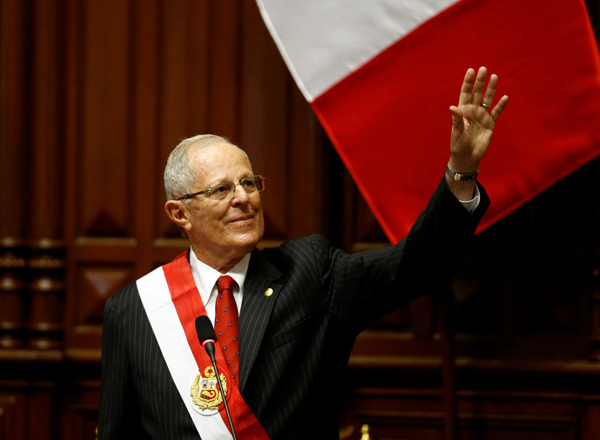Peru's new president outlines ambitious vision in inauguration speech
(Xinhua) Updated: 2016-07-29 10:00
 |
|
Peru's President Pedro Pablo Kuczynski waves to the audience after receiving the presidential sash during his inauguration ceremony in Lima, Peru, July 28, 2016. [Photo/Agencies] |
In other policy promises, Kuczynski pledged that more attention would be given to Peru's remote, border areas, that a fiscal reform would lower the tax burden on Peruvian businesses, and that productive sectors would be encouraged to formalize their labor situations.
One announcement that is likely to play well internationally was that Peru remains fully committed to the UN's 2030 Agenda for Sustainable Development, with Kuczynski saying his government's goals are aligned with it.
Finally, the president said that Peru would finish the process to join the Organization for Economic Co-operation and Development (OECD) by 2021, which he said would be evidence of Peru's commitment to integral development.
This pledge raised some eyebrows among the media, with the Peru21 news platform expressing doubts that this would be possible, given that the OECD is known as "the club of the rich."
The OECD has already outlined four areas Peru needs to work on if it hopes to join: build a decentralized fiscal regime, allowing for regions to offer better public services; implement policies to favor economic diversification and broaden the export basket; ensure better coordination between urban and rural policies while striving for improved collaboration between Lima and regional governments; and improving national statistics and information systems in order to improve public policies.
In the days leading up to his swearing-in, Kuczynski has also had to deal with the shadow of former president, Alberto Fujimori, currently serving a lengthy prison sentence for crimes against humanity.
His daughter, Keiko, was defeated by Kuczynski in the race for the presidency but her Popular Force (PF) party holds an absolute majority in Congress.
This has led to PF lawmakers encouraging Kuczynski to pardon Fujimori but both the new president and his predecessor, Humala, categorically ruled out doing so.
Having won the presidential election by the narrowest of margins (0.24 percent), Kuczynski cannot afford to alienate Keiko Fujimori and her PF party, for fear of seeing his ambitious agenda surrendered to legislative gridlock.
Kuczynski has appointed an uncontroversial cabinet of technocrats and experts, few of them tied to the rivalry with Fujimori, which was widely praised.
However, Peruvians risk being particularly impatient with any delays, with Humala leaving office with a record low popularity rating of 19 percent.






